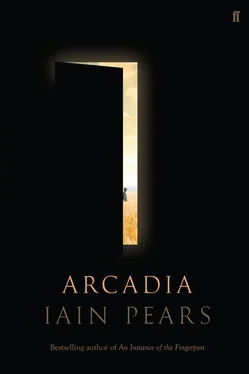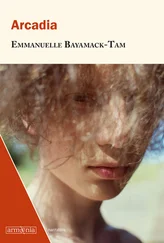Gontal bowed and withdrew.
‘How was that?’ Lytten whispered to Rosalind.
‘Pretty good,’ she said. ‘You’re a natural.’
Lytten hoped very much that the participants would talk for as long as possible. Rosie, the one in his house, had told him that Anterwold existed, but he had assumed that she was talking nonsense. Yet here he was, listening to people act out his own book. Except that they weren’t. He had jotted down notes on the death of Thenald, but only as a device to explain Catherine. It was not something that he had ever intended to explore in any depth. He had only very vaguely forged a link between Pamarchon and the death, and then once more to explain his existence in the forest, so he could discourse on the young and those outside the law. Not for a single moment had he thought about drawing all the threads together into a murder. He wasn’t writing a detective story, dammit.
Yet this — thing — this invention, this whatever it was, had developed some huge crisis out of it all. Taken a few pencilled jottings and extrapolated outwards, adding the details he had never bothered with. This trial, for example. The legal method, the stone circle, the crime, the participants. Idle musings had come together in ways he had never thought possible. And there they were. Gontal talking, laying into Catherine, while Jay stood stony-faced, no doubt wondering how he was going to reply. Catherine and Pamarchon, standing apart on opposite sides. Henary, who currently felt that he had failed everyone. He didn’t know how lucky he was.
Had this been Shakespeare or Sidney, it would all have been easy. In As You Like It a goddess comes down and sorts it out. In A Midsummer Night’s Dream the action is controlled and directed by Oberon. Homer also, when he gets stuck, sends a god from Olympus to intervene. Modern novelists of a lesser variety have recourse to a man jumping through a door holding a gun. But, of course, that was exactly what was happening. He was the coincidence, the god descending. He had appeared out of nowhere and was now meant to wave his magic wand and sort everything out. He was Oberon, Athene, even Poirot himself. The trouble was that he had no magic wand, and he hadn’t a clue how to sort it out, and his little grey cells were not at their best this morning. He hadn’t even had time to finish his coffee.
He listened to Gontal’s speech, and it didn’t help him in the slightest.
Gontal scarcely touched on the subject of who had actually killed Thenald. Lytten hoped for detail, evidence, background, something to give him a hint. He got none of it. Gontal defended Pamarchon by barely referring to him. The man began with motive, hammering away at the fact that Catherine had gained the most from her husband’s death. That this was the best reason to suspect her guilt. That she had no other claim to Willdon, and could not have taken it unless both her husband and Pamarchon were either dead or discredited, preferably both. That she was, therefore, a monster of unparalleled duplicity.
Hardly based on solid evidence, but the trouble was that Gontal didn’t even stick to this line of argument. Rather, he picked out minor details, then referred them to some part of the Story and launched into a lengthy piece of literary criticism. The object seemed to be to find which story was the closest parallel. The more the parallels, the greater the proof. Gontal’s entire speech, in fact, was a complex exercise designed to persuade the audience that the murder of Thenald most closely resembled a story in which a wicked stepmother steals from her husband and blames his son. ‘For what is murder, except the theft of life?’ Gontal intoned gravely to make an entirely specious link between the two.
He finished with a positive broadside of quotations, voice rising melodramatically, right arm extended. Lytten knew where that came from. A performance of Racine in France when he was young, the static, ponderous, overwrought declamation, the mannered pose, the over-abundance of language. Yes, that was it, and it was evidently as big a success here as it had been at the Comédie-Française: the audience was cowed. Gontal had a smirk of satisfaction on his face as he turned with a flourish to Lytten, then to Pamarchon, then to the people watching, silent in admiration for the man’s skill and learning. Gontal felt sure it was in the bag. How could a seventeen-year-old student stand a chance against such overwhelming erudition?
Lytten looked at the slender figure and crooked his finger to summon him.
‘You seem afraid, young man.’
Jay nodded.
‘I believe I made you a little ill-disciplined. Would you agree?’
Jay said nothing.
‘I made you so for a reason. Use my gifts. Do not try to be a second-rate Gontal, but speak as you feel. Remember, your job is to convince me, not anyone else, and I really don’t care for extraneous literary allusion. If I have to sit through another speech as dull as that one, I will conclude that I have created the most boring world that could ever exist, and will erase it and start again. It is your job to redeem this place. Do you understand?’
‘No, Majesty.’
‘Get to the point. Speak of the world and of people and deeds. Not of books and precedents and quotations. Make your learning serve your heart, not the other way around. Be yourself, dear boy. Use what you know.’
Jay bowed and faced the crowd. He took a deep breath and began.
‘People of Willdon,’ Jay began conventionally enough, ‘you have heard Scholar Gontal deliver a fine discourse, as it should be delivered. He is a great scholar, intelligent and learned. I am not. I cannot deliver my discourse with the power that he can summon. I will not pronounce in the correct forms, with the proper weightings and with an impeccable structure. I can only speak the truth, simply and directly. I must confine myself to what happened, and to what I know.
‘So let me tell you plainly that he is wrong when he says that Pamarchon is innocent, Catherine guilty. You noted, I am sure, that Scholar Gontal said little to defend Pamarchon. He briefly told you that he was innocent, but his main point was to insist that this was only because Catherine is guilty. That was his entire case. He besmirched the reputation of both.
‘I do not accept his conclusion or his method. I will do the opposite, and defend Catherine by defending Pamarchon also. I ask you to decide that both are innocent.’
He turned round briefly to see what the reaction was so far. Rosalind winked at him supportively; the spirit on the tomb nodded, as if in approval, encouraging him to continue. Jay tried to keep them in mind and not Henary, who he was sure would be horrified by his approach.
‘Let me start by speaking in favour of the man I am supposed to be accusing. Pamarchon, the outlaw, the bandit, the murderer. I have spent several days with him, and seen him with many people. He rules his band with justice and care; he takes pains not to abuse those he lives near. His followers are with him out of love, not fear. He shows no man violence and no woman indignity. Think back to the days before his fall. Did he not intervene to cool the wrath of his uncle? Is that the behaviour of a violent murderer? Was there anything, any deed or statement, which made you think him capable of such a crime? If there is, then speak.’
No one did, fortunately. It was a risk, asking an audience for a reaction and staking all on getting the right one. If Gontal had had more time to prepare his followers, Jay’s entire strategy could have collapsed then and there. Still, his luck held.
‘I see that I have had some success in damaging my own case. For I have strengthened the case against Catherine, and it is not a bad case at all. Did she love her husband? Possibly not, but then nor did anyone else. Did she move quickly to take control of Willdon on his death? Most certainly. Does she have the intelligence to do something like this? Very definitely. She is a woman of great resource, courage and daring. You know this, you who know her better than I do.
Читать дальше












